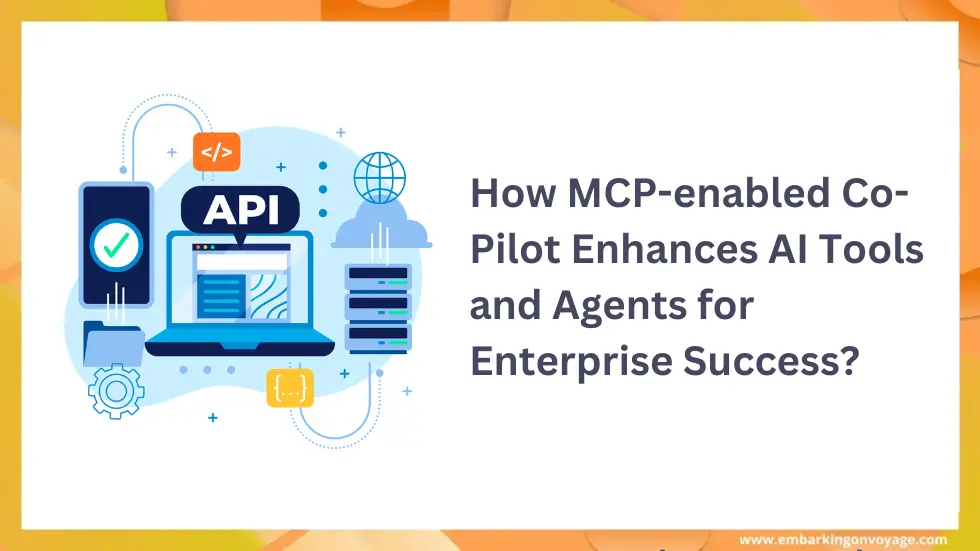In today’s rapidly evolving AI landscape, enterprise leaders are constantly exploring ways to make AI systems smarter, faster, and more cost-efficient — without rebuilding from scratch.
MCP-enabled Co-Pilot is emerging as a transformative solution, enabling AI tools and agents to work more effectively by standardizing how they access, interpret, and apply context.
This blog explores how connecting an MCP-enabled Co-Pilot to AI tools and agents can streamline enterprise AI delivery, reduce total cost of ownership (TCO), and drive strategic business outcomes.
What Is MCP-enabled Co-Pilot?
At its core, Model Context Protocol (MCP) is a framework that allows AI models to interact seamlessly with context — whether it’s real-time data, application states, business logic, or domain-specific knowledge.
An MCP-enabled Co-Pilot acts like a universal translator between your AI models and the tools or datasets they need. Instead of building custom integrations for each new system, MCP provides a shared language for context exchange.
This capability is critical because many AI projects fail not due to poor model performance, but because the AI doesn’t access the right data at the right time. By leveraging an MCP-enabled Co-Pilot, enterprises ensure their AI agents can operate with maximum efficiency and accuracy.
Why MCP-enabled Co-Pilot Is Essential for Enterprise AI Delivery
Enterprise AI ecosystems often include:
- AI models (LLMs, predictive models, recommendation engines)
- External tools and APIs (CRM, ERP, ticketing systems)
- Knowledge bases (structured and unstructured)
- Human-in-the-loop processes
Without MCP-enabled Co-Pilot, integration becomes a tangled web of custom connectors and brittle workflows. With MCP, AI agents dynamically request and receive relevant context, enabling:
- Faster time-to-market for AI-powered features
- Scalable integration of new tools or agents
- Lower maintenance costs over time
How MCP-enabled Co-Pilot Connects AI Tools & Agents
Integration happens in three key layers:
- Context Definition Layer
Identify the types of information AI agents need — for instance, travel itineraries, fraud risk scores, or customer loyalty profiles. MCP converts these into standardized context objects.
- Context Broker Layer
The MCP-enabled Co-Pilot serves as a broker between AI agents and tools. Agents simply request context; MCP retrieves it from the right source without requiring agent-level knowledge of system architecture.
- Execution & Feedback Loop
AI agents act on the provided context, and results are fed back into MCP so other agents can leverage updated knowledge, enabling continuous learning.
Industry Use Cases of MCP-enabled Co-Pilot
1. Travel & Hospitality
- Dynamic Itinerary Adjustments: AI travel assistants pull live flight, hotel, and weather data through MCP-enabled Co-Pilot, automatically managing bookings and reducing customer service overhead.
- Hyper-Personalized Guest Experiences: Agents access loyalty profiles and occupancy data, delivering faster service and better guest satisfaction without redoing integrations.
2. Cybersecurity
- Threat Intelligence Fusion: Security AI agents use MCP-enabled Co-Pilot to connect with firewalls, SIEM, and endpoint feeds, enabling faster threat detection.
- Automated Incident Reporting: Incident management AI tools access compliance templates via MCP, saving time and ensuring audit readiness.
3. Fintech
- Real-Time Fraud Detection: MCP-enabled Co-Pilot provides AI models with transaction context, behavioral patterns, and KYC data for instant decisions.
- Personalized Financial Advice: Agents pull portfolio and market data via MCP, delivering scalable, low-cost, and relevant recommendations.
Business Impact: Delivery and Total Cost of Ownership
1. Faster Delivery Cycles
- Without MCP-enabled Co-Pilot: Custom integrations slow delivery timelines and extend QA cycles.
- With MCP-enabled Co-Pilot: Standardized context integration enables new tools and agents to connect in days instead of months.
2. Lower Total Cost of Ownership
- Reduced integration costs: MCP eliminates expensive one-off connectors
- Lower maintenance overhead: System updates don’t require AI logic rewrites
- Higher ROI: Data pipelines feed multiple agents without duplication
3. Strategic Agility
- Experiment with new AI vendors or models easily
- Swap tools while maintaining a stable context layer
- Quickly adapt to changing market demands
Implementation Roadmap for Enterprises
- Audit Context Needs: Identify the contextual data AI agents require.
- Select or Build MCP Framework: Ensure security, scalability, and compliance.
- Pilot with a Single Agent: Measure improvements in delivery speed, accuracy, and maintenance.
- Scale Gradually: Focus on high-impact workflows first.
- Monitor and Optimize: Continuously track metrics and refine context definitions.
Competitive Advantage
An MCP-enabled Co-Pilot is not just a technical upgrade — it’s a strategic differentiator. Enterprises gain:
- Reduced risk of AI project overruns
- Faster adaptation to new market conditions
- Lower operational costs for AI-powered services
Organizations investing in MCP now will be more agile, scalable, and capable of delivering AI solutions reliably in an increasingly competitive landscape.
Final Thought
The MCP-enabled Co-Pilot doesn’t just make AI smarter — it makes businesses more nimble, cost-efficient, and future-ready. For enterprise leaders, this translates into actionable leverage in strategic planning and AI-driven innovation.
Additional Resources:
